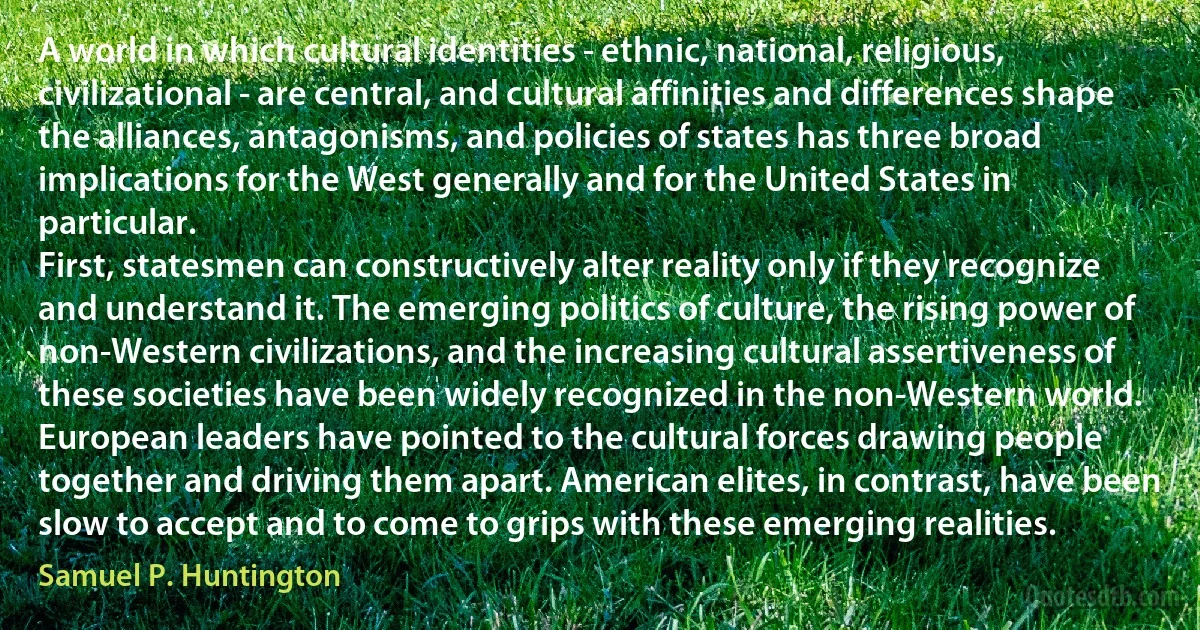
A world in which cultural identities - ethnic, national, religious, civilizational - are central, and cultural affinities and differences shape the alliances, antagonisms, and policies of states has three broad implications for the West generally and for the United States in particular. First, statesmen can constructively alter reality only if they recognize and understand it. The emerging politics of culture, the rising power of non-Western civilizations, and the increasing cultural assertiveness of these societies have been widely recognized in the non-Western world. European leaders have pointed to the cultural forces drawing people together and driving them apart. American elites, in contrast, have been slow to accept and to come to grips with these emerging realities.
Samuel P. HuntingtonRelated topics
apart central contrast emerging ethnic increasing national people politics power rising slow three west world assertiveness statesRelated quotes
We must stand united in our support of other young democracies, from the people of Lebanon struggling to maintain their hard-won independence, to the people of the Palestinian Territories, who deserve a free and peaceful state of their own. We must stand united in our support of the people of Georgia. The United Nations Charter sets forth the equal rights of nations large and small. Russia's invasion of Georgia was a violation of those words. Young democracies around the world are watching to see how we respond to this test. The United States has worked with allies in multilateral institutions like the European Union and NATO to uphold Georgia's territorial integrity and provide humanitarian relief. And our nations will continue to support Georgia's democracy.

George W. Bush
There is legitimate debate about many of these decisions. But there can be little debate about the results. America has gone more than seven years without another terrorist attack on our soil. This is a tribute to those who toil day and night to keep us safe – law enforcement officers, intelligence analysts, homeland security and diplomatic personnel, and the men and women of the United States Armed Forces. Our nation is blessed to have citizens who volunteer to defend us in this time of danger. I have cherished meeting these selfless patriots and their families. America owes you a debt of gratitude. And to all our men and women in uniform listening tonight: There has been no higher honor than serving as your Commander in Chief.

George W. Bush
We owe it, therefore, to candor and to the amicable relations existing between the United States and those powers to declare that we should consider any attempt on their part to extend their system to any portion of this hemisphere as dangerous to our peace and safety. With the existing colonies or dependencies of any European power we have not interfered and shall not interfere. But with the Governments who have declared their independence and maintain it, and whose independence we have, on great consideration and on just principles, acknowledged, we could not view any interposition for the purpose of oppressing them, or controlling in any other manner their destiny, by any European power in any other light than as the manifestation of an unfriendly disposition toward the United States.

James Monroe
Americans combine to give fêtes, found seminaries, build churches, distribute books, and send missionaries to the antipodes. Hospitals, prisons, and schools take shape in that way. Finally, if they want to proclaim a truth or propagate some feeling by the encouragement of a great example, they form an association. In every case, at the head of any new undertaking, where in France you would find the government or in England some territorial magnate, in the United States you are sure to find an association. I have come across several types of association in America of which, I confess, I had not previously the slightest conception, and I have often admired the extreme skill they show in proposing a common object for the exertions of very many and in inducing them voluntarily to pursue it.

Alexis de Tocqueville
The student should have enough knowledge of his or her cultural tradition to know how it got to be the way it is. This involves both political and social history, on the one hand, as well as the mastery of some of the great philosophical and literary texts of the culture on the other. It involves reading not only texts that are of great value, like those of Plato, but many less valuable that have been influential, such as the works of Marx. For the United States, the dominant tradition is, and for the foreseeable future, will remain the European tradition. The United States is, after all, a product of the European Enlightenment. However, you do not understand your own tradition if you do not see it in relation to others. Works from other cultural traditions need to be studied as well.

John Searle
